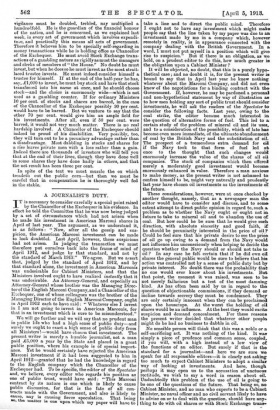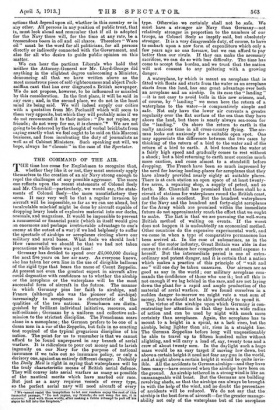A JOURNALIST'S DUTY.
IT is necessary to consider carefully a special point raised by the Chancellor of the Exchequer in his evidence. In effect he told the Committee that he was now being judged by a set of circumstances which had not arisen when he made his investment in American Marconi shares in April of last year. The argument, as we understand it, is as follows : " Now, after all the gossip and sus- picion, the American Marconi investment can be made to look doubtful. Last April, however, these suspicions had not arisen. In judging the transaction we must the:.efore put ourselves back into the frame of mind of April 1912, and judge by that standard, and not by the standard of March 1913." We agree. But we assert that, judged by the standard of April 1912, and by that standard alone, the investment in American Marconis was undesirable for Cabinet Ministers, and that the Ministers involved ought to have realized instantly that it was undesirable. An Attorney-General, and especially an Attorney-General whose brother was the Managing Direc- tor of the English Marconi Company, and a Chancellor of the Ewhequer, one of whose colleagues was the brother of the Managing Director of the English Marconi Company, ought in April 1912 each to have said : "Whatever else I invest in I am not going to invest in American Marconis, for that is an investment which is sure to be misunderstood."
We will go further and we will say that no prudent man in public life who had a high sense of public duty—and surely we ought to exact a high sense of public duty from all Ministers !—would have chosen that investment. The present writer is merely a humble journalist, not a man paid £5,000 a year by the State and placed in a great public position, where his example is of special import- ance. Yet he would certainly have rejected the American Marconi investment if it had been suggested to him in April 1912—granted that he had the knowledge in regard to the English company which the Chancellor of the Exchequer had. To be specific, the editor of the Spectator and, we believe, every editor who regards his position as one of public trust, would have said : "This Marconi contract by its nature is one which is likely to cause public discussion, for that is the fate of all con- tracts made with the Government, and also is likely to cause, nay is causing fierce speculation. That being so, the matter is one upon which my paper will have to take a. line and to direct the public mind. Therefore I ought not to have any investment which might make people say that the line taken by my paper was due to an investment made by me in a company which, however remotely in reality, is in appearance connected with the company dealing with the British Government. In a. word, I must not put myself in a position which will give rise to suspicion." But if there is an obligation, as we hold, on a prudent editor to do this, how much greater is the obligation upon a Cabinet Minister ?
It will be objected, no doubt, that this is a purely hypo- thetical case; and no doubt it is, for the present writer is bound to say that in April last year he knew nothing whatever about the Marconi Company, and did not even know of the negotiations for a binding contract with the Government. If, however, he may be pardoned a personal and non-hypothetical statement by way of illustration as to how men holding any sort of public trust should consider investments, he will ask the readers of the Spectator to consider the following facts. Last year, owing to the coal strike, the editor became much interested in the question of alternative forms of fuel. This led to a. certain study of the problem of mineral oil and its uses, and to a consideration of the possibility, which of late has become even more immediate, of the ultimate abandonment of coal by the British Navy and the substitution of oil. The prospect of a tremendous extra demand for oil if the Navy took to that form of fuel led at once to the thought that such changes would enormously increase the value of the shares of all oil companies. The stock of companies which then offered merely a moderately good investment would become enormously enhanced in value. Therefore a man anxious to make money, as the present writer is not ashamed to confess himself to be, might very naturally and prudently last year have chosen oil investments as the investments of the future.
These considerations, however, were at once checked by another thought, namely, that as a newspaper man the editor would have to consider and discuss, and to some extent attempt to direct public opinion in regard to, such a problem as to whether the Navy ought or ought not in future to take to mineral oil and to abandon the use of coal. But how could he be sure that he would give such direction, with absolute sincerity and good faith, if be should be pecuniarily interested in the price of oil.? Could he feel sure that his private desire to see the price of oil go up owing to a demand from the Navy would not influence him unconsciously when helping to decide the question whether the Navy should or should not take to oil ? In any case he felt certain that if he did own oil shares the general public would be sure to believe that his action was controlled not by a sense of public duty but by private interest. No doubt there was the probability that no one would ever know about his investments. But that point, the moment it was raised, was seen to be not merely fallacious but a test of the most damning kind. As has often been said by us in regard to the question of objectionable commissions, if they demand or incline towards secrecy they must be condemned. They are only certainly innocent when they can be proclaimed upon the housetops. At the worst the holding of oil shares would be an influence. At the best they would excite suspicion and demand concealment. For these reasons the present writer decided that whatever other people might do be had no business to dabble in oil.
No sensible person will think that this was a noble or a self-sacrificing act. It was nothing of the kind. It was simply a piece of prudence and common sense, coupled, if you will, with a high instead of a low view of the functions of an editor. But surely if that is the standard for a journalist—and here we are sure we speak for all responsible editors—it is clearly not asking too much to expect Cabinet Ministers to adopt a similar way of looking at investments. And here, though perhaps it may open us to the accusation of unctuous rectitude, we wish to say a word in season about oil. Undoubtedly this problem of the use of oil is going to be one of the questions of the future. That being so, no Cabinet Minister, and no man who expects to be a Cabinet Minister, no naval officer and no civil servant likely to have to advise on or to deal with the question, should have any- thing to do with oil shares or with Stock Exchange trans.. actions that depend upon oil, whether in this country or in any other. All persons in any position of public trust, that is, must look ahead and remember that if oil is adopted for the Navy there will, for the time at any rate, be a tremendous boom in oil and oil shares. Therefore "Ware oils' must be the word for all politicians, for all persons directly or indirectly connected with the Government, and also for all who desire to guide public opinion on this matter.
. We can hear the partizan Liberals who hold that neither the Attorney-General nor Mr. Lloyd-George did anything in the slightest degree unbecoming a Minister, denouncing all that we have written above as the most monstrous piece of self-righteousness and abject Peck- sniffian cant that has ever disgraced a British newspaper. We do not propose, however, to be influenced or muzzled by this consideration. In the first place, it will be said in any case ; and, in the second place, we do not in the least mind its being said. We will indeed supply our critics with a quotation from Mr. Pecksniff which will seem to them very apposite, but which they will probably miss if we do not recommend it to their notice : "Do not repine, my friends ; do not weep for me, it is chronic."* We are not going to be deterred by the thought of verbal brickbats from saying exactly what we feel ought to be said on this Marconi business, and from inculcating the duty of journalists as well as of Cabinet Ministers. Such speaking out will, we hope, always be " chronic " in the case of the Spectator.















































 Previous page
Previous page